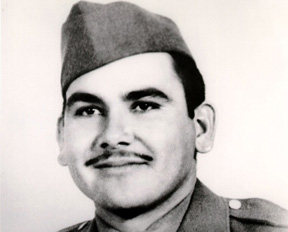
Private Felix E. Longoria from Three Rivers, Texas, was one of the soldiers who gave his life during World War II. Felix Longoria was drafted into the U.S. Army in 1944, and completed six weeks of basic training in Fort Ord, California with the 27th Infantry Regiment of the 25th Infantry Division. He was deployed to Luzon Island for his first combat assignment as an infantry man. He soon volunteered to join a patrol with orders to dislodge enemy snipers. Army Private Longoria was killed in 1945 at the age of 25 by a Japanese sniper and was awarded a Bronze Service Star, a Good Conduct Medal and a Combat Infantryman’s Badge.1 His remains were not recovered and identified until 1949 when they were returned to Three Rivers, Texas, his hometown.2
World War II, a global war, lasted from 1939 to 1945 and was the deadliest conflict in human history. The National WWII Museum reports over 500,000 Latinos (including 350,000 Mexican Americans and 53,000 Puerto Ricans) served in WWII. However, exact numbers are difficult to calculate because except for the 65th Infantry Regiment from Puerto Rico, Latinos were not segregated into their own units the way African Americans were.3 This article is not about World War II itself, instead it tells the story of one of our own Mexican American World War II Heroes from Texas. This affair shows how his community discriminated against him and his family after the war had ended despite his heroic military service for the US.
Three Rivers, Texas is a small town between Corpus Christi and San Antonio known for its hunting and fishing. In the early 1900’s, the main industries were a glass factory and a natural gas refinery. As most towns in the deep South, Three Rivers was ripe with racial segregation and discrimination. In South Texas in the 1940’s, Mexican Americans were treated as second class citizens despite many having their U.S. Citizenship. All were called Mexicans, they were turned away from local shops, swimming pools, and even banned from the barbershops. Signs were posted declaring, “No dogs, no blacks or Mexicans allowed” and “We serve whites only, no Spanish or Mexicans.”4 It was still a time when many Mexican women could only work as cleaning ladies, for Anglo families, sometimes getting paid as little as 15 cents for a day’s work. Mexicans were considered non-white despite being counted as whites on the census.5 World War II caused the nation to reexamine the laws. The Texas Legislator’s 1943 “Caucasian Race Resolution” granting Latin Americans status as “white” citizens notwithstanding.6 Thousands of Latino-American veterans returned from the war to find they were still second class citizens at home. The town of Three Rivers was no exception, Mexican Americans still lived on one side of the railroad tracks with Spanish street names and whites on the nicer side of the tracks.
Small towns were usually quick to acknowledge the death of American Heroes but not for Private Longoria’s. In mourning the death of her husband, Beatrice Longoria was to make arrangements for the wake service that she wanted to hold in their hometown. When she spoke to the Rice Funeral home, the only funeral home in town, the director, Tom Kennedy, declined to plan the service because he explained Felix Longoria was “Mexican” and because “the whites would not like it.”7 Mr. Kennedy was willing to set up a wake at the Longoria home as was the customary treatment of Mexican Americans by the Three Rivers community. Kennedy at one time was in the military, where he fought in Europe, suffered shrapnel wounds and was hospitalized until he went back to the United States. Therefore, it came as a surprise that Kennedy had no compassion for his fallen brother at arms.

Though Felix Longoria’s father had purchased a family plot on the Westside of the town where there was a fence that separated the Mexicans from the all-white burial plots, it was the service for the wake where the outrage began. All Beatrice Longoria wanted was for her husband’s service to be in his hometown with family and friends. Mr. Kennedy angered the Mexican-American community by not allowing the wake to be held at the funeral home. How was it that his ethnicity rather than his ultimate sacrifice for the country mattered more in determining whether he would received a proper burial with full honors. Hurt, confused, and in mourning, Beatrice’s sister Sarah Posas contacted Dr. Hector P. Garcia, a civil rights organizer. Dr. Garcia was no stranger to this type of discrimination so he agreed to help the Longoria family. Many time he was told, “You are not Americans, you are Mexicans” Dr. Garcia would respond by saying, “Well, we are American citizens of Mexican origin, so let’s point out to the people we are really Americans”.8 As a civil rights activist, he used his wartime skills to organize the community. He then contacted Senator Lyndon B. Johnson in Washington. Senator Johnson saw this as a national cause and took it all the way to the White House. The decision to bury Felix Longoria in a place other than Three Rivers became a collective demand for justice, dignity and equality. With collaborated work from Dr. Garcia and Senator Johnson, Felix Longoria’s remains were re-interred on February 16, 1949 in Arlington National Cemetery with full military honors.9 Dr. Garcia founded the American GI Forum in 1948 to help Military Veterans who needed assistance to receive the services and benefits they had earned as soldiers.
In 2010, Santiago Hernandez a resident from Corpus Christi gained permission from the funeral home owner to place a Texas Historical Marker on the property in memory of Felix Longoria. This came with some opposition from many white commission members, but the marker was placed. In 2014, under new management, the funeral home was demolished and converted into a parking lot. The original historical marker was allegedly hit by a driver who backed up into it and was removed. Santiago Hernandez later tried to convince the Three Rivers community to rename the local post office after Private Felix Longoria since the Texas Historical Marker had been damaged and not replaced. 10 Many community residents did not support the idea. Since the post office is a Federal building, renaming it requires a bill in the US Congress. Mr. Hernandez then contacted Congressman Lloyd Doggett who represented the Three Rivers area to inquire whether he would help change the name of the Post Office to honor Longoria. On July 22, 2004 Congressman Doggett proposed to the House of Representatives Bill 4911 that designated the United States Postal Service located in Three Rivers, Texas, as the “Private Felix Z. Longoria Veterans’ Memorial Post Office”.11

After all these years, the story about Felix Longoria, which became a catalyst for the American GI Forum and the spread of civil rights and pride among Mexican Americans is rarely spoken about in Three Rivers, Texas. Many residents still deny discrimination and segregation within the town were the motives. Talking to the townspeople many say, “This was never about race”.12 The discrimination against Felix Longoria remain unspoken when travelers from distant areas come to learn about where the Longoria Affair began. You would assume, given that a historical moment occurred in Three Rivers would be especially vigilant about anything involving the Longorias and the right for equality, but no one-including the mayor, the owner of the property who reportedly tore down the structure and members of the historical commission would speak about Felix Longoria. The Felix Longoria marker was replaced years later, it is now located on the city square in Three Rivers. 13

Some might ask why resurrect such memories and not just let the memory of Felix Longoria rest in Arlington National Cemetery alongside all other war heroes. This ghost of their past haunts the town and many would prefer to forget about it. However, communities must make amends for the many wounds inflicted by discrimination against the heroes who sacrificed their lives for the United States of America. The Historic Marker is but one small way to redress decades of open discrimination against Mexican American Veterans. This fight and ultimate victory that validates the full Citizenship rights of those born American and from Hispanic or Mexican ethnicity changed the lives of everyone in the town. Private Felix Longoria made history while alive in World War II and after his death continued to challenged discrimination in Three Rivers, Texas. While it may be a time in history some would rather not remember, the Longoria Affair sheds light, honor, and prestige forever on the Mexican American Community and the sacrifices of Gold Star families regardless of ethnicity.
- Patricia Portales, “An affair to Remember,” in San Antonio Current, august 11, 2010. ↵
- “Felix Longoria,” 1994-2011, Arlington National Cemetery, Website. www.arlingtoncemetery.net. ↵
- The National World War II Museum, Los Veteranos – Latinos in WWII, retrieve on 5/1/2020 from www.nationalww2museum.org . ↵
- Ruben Narrette Jr., “Navarette: Injustice for an American Veteran”, Press Democrat, November 10, 2010. ↵
- Ruben Narrette Jr., “Navarette: Injustice for an American Veteran”, Press Democrat, November 10, 2010. ↵
- Zachary Foust, “Caucasian Race Resolution’, July 9, 2019, Handbook of Texas Online, http://www.tshaonline.org/handbook/online/articles/mlc04. ↵
- Patricia Portales, “An affair to Remember,” in San Antonio Current, august 11, 2010. ↵
- Hector Garcia, interview, Mexican American Experience, July 9, 1969, hosted by David G. McComb, https://www.drhectorgarciafoundation.org. ↵
- Carroll, Patrick. Felix Longoria’s Wake, Publisher: The University of Texas Press, 2003. ↵
- John J. Valadez, The Longoria Affair. (2010) Boston: PB Distribution 2010. DVD. ↵
- R. 4911, July 22, 2004, 108th Congress 2 D Session. ↵
- Bob Richter, “Consider the other side of the ‘Longoria affair,'” San Antonio Express News, January 7, 2012. ↵
- Elaine Ayala, “Longoria marker to get new spot in Three Rivers,” San Antonio Express News 2015. ↵



92 comments
Sudura Zakir
Amazing context written well very informative. Depicting about Longoria’s accomplishment in World Word II and lost his life in the war. But still this Mexican -American hero plays significant role in the history of Mexican American community. At that Mexicans were given less importance. From history they were not considered as Americans although they were citizens. Topic of civil rights and racism were not even discussed. Overall the whole concept focus on Mexican American people and their rights specifically counting on Longoria serving in world war. I learnt almost a different topic about Mexican American group.
Gaitan Martinez
The story was absolutely interesting and I’m glad that it’s gained attention. Felix Longoria gave his life for our country and because of the color of his skin, there were issues for his burial. I’m so glad that the issue was addressed, resolved, and kept his story alive. Reminds me of this one story I heard where a black veteran walked into a coffee shop, and saw that a captured enemy was allowed into a store for only white, the veteran has a mental breakdown and started crying because he saw the injustice, how can a white enemy be allowed into a shop, and not a loyal black veteran? I can understand the veteran’s response, I would feel the same.
Maximillian Morise
The sacrifice of Felix E. Longoria echoes that of many other Latino-Americans who put down their lives fighting for their country in the bloody chaos of World War 2, and to disrespect his death due to the issue of racism and prejudice is a heart wrenching and upsetting thing. The Longoria Affair is a show of how discrimination can even affect how we think of death itself when it pertains to minorities and the respect we give those who are of minority communities. The author did well to showcase this incident, as it is a shocking account of prejudice against a fallen Hero.
Carlos Alonzo
The publication was informative, that about 500,000 Latinos served in WWII and argues for Mexican American WWII heroes and how their community, Three Rivers, Texas, discriminated against Longoria and his family after the war was over. This is a case for the continued need for social justice, since the article depicts Latinos were not segregated into their own units for WWII; therefore, Longoria’s heroism highlights his Mexican American ethnicity and should be honored.
Elias Muniz
Private Longoria’s story is a good example of civic engagement and involvement in a small community. It is sad to see that someone who gave their life for their country was treated in such a manner simply because those like him were told “You are not Americans, you are Mexicans”. The rally around his funeral arrangements from his community and fellow veterans shows what can be accomplished when a community is organized effectively. It shows that no matter the cause, engagement and involvement in something you believe in can lead to change for the better, in this case, allowing private Longoria to be buried with honor. I appreciate the note at the end that communities must recognize the wounds they have caused as it touches on the ways in which community members can engage civically to ensure the wounds are healed.
Yaniev Ibarra
Felix E. Longoria should proudly be remembered. The article does a wonderful job bringing not only awareness to this hometown heroes story but also the degree of discrimination Mexican Americans faced in South Texas. His story documents the racism and segregation of the time, and it is important to highlight the civil right activities that endured to allow us to be in the society we are in today.
Juan Aguirre Ramirez
Reading about Private Longoria’s story was both interesting and sad. Fighting for your nation and giving up your life but not receiving proper military honors just because of your ethnic background is terrible. Also, the fact that Lyndon B. Johnson was involved in this case and helped make sure the body was buried right was surprising.
Rosa Inocencio
Great article, it was very interesting and informative. I have heard about Private Feliz E. Longoria before, but I was never fully aware of everything that had happened. It is honestly very disappointing the way people were back then because Longoria, including many others who weren’t classified as “whites” fought in the war, and they were not recognized the way they deserved to be recognized. It was very unfair of everyone to not give full recognition to those who were Mexican because they were the ones that showed up to the war and fought not only for the country but for their lives too. Individuals like Longoria and many others who weren’t classified as “white” deserved to be treated as heroes when they arrived home, not like second-class citizens because they are truly heroes. Great Article!
Rosa Inocencio
Great article, it was very interesting and informative. I have heard about Private Feliz E. Longoria before, but I was never fully aware of everything that had happened. It is honestly very disappointing the way people were back then because Longoria, including many others who weren’t classified as “whites” fought in the war, and they were not recognized the way they deserved to be recognized. It was very unfair of everyone to not give full recognition to those who were Mexican because many of them were the ones that showed up to the war and fought not only for the country but for their lives too. Individuals like Longoria and many others who weren’t classified as “white” deserved to be treated as heroes when they arrived home, not like second-class citizens because they are truly heroes. Great Article!
Christian Lopez
When looking at American History we tend to see it as very white centered. With only a few handful being minorities more specifically African American it is refreshing hearing about Latino/Hispanic heroes and historical figures. With situations such as this we don’t know how many minority figures have been lost to time that deserved their praise. Taking the time to share this story and for people making the changes to recognize this figures is the right step forward to equal representation.